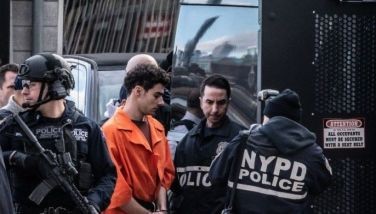Fighting season is testing ground for Afghan force
KANDAHAR — Abdul Malik and his fellow Afghan soldiers were driving across the arid and volatile south when their armored personnel carrier struck a roadside bomb. Malik found himself outside the vehicle, dazed but aware of his three comrades nearby. One had a serious head wound.
Help came quickly: US helicopters swooped in and took them to the Afghan military hospital in Kandahar, the largest in the region. Malik lost his leg below the knee. Without the quick rescue, he would likely have lost his life. His three buddies all died.
"I could see his brains on the ground near me," Malik said.
As part of preparations for the final withdrawal of international combat troops by the end of 2014, Afghanistan's security forces are being pressed into service — alone. This year's fighting season is the first in 12 years of war that Afghan troops are responsible for security in 90 percent of the country.
But the Afghans are still heavily dependent on international air support to ferry the wounded to hospitals and for gunships to defend troops who are isolated and under attack.
With NATO and the US military providing only advice and assistance on request, the Afghans' battlefield performance this year will decide how much equipment and training they still need.
After 2014 the US is expected to leave behind a residual force of 8,000 to 10,000 troops, mostly as mentors and trainers. NATO is being asked to contribute several thousand as well, but so far only Germany has promised 800 troops.
Some in the US military see a steep learning curve ahead for the 350,000 Afghan service personnel.
In eastern Nangarhar province where the US 1st Brigade Combat Team, 101st Airborne division, is advising the Afghan National Army, Lt. Col. Matthew Stader said Afghan troops need advisory teams for intelligence, surveillance and reconnaissance operations. They lack the drones used heavily by US forces.
Still, Stader said Afghan troops are doing their own patrols, clearing routes and removing roadside bombs.
"I think they are doing well, but it just looks different than the Americans," said Stader, of Annapolis, Maryland.
Afghan forces can resupply themselves with food and fuel and water but are still struggling with planning, logistics, equipment maintenance and contracting, Stader said, adding that the brigade he is currently mentoring in eastern Afghanistan needs at least another year of advising before it will be able to operate independently.
"For years we've created Afghan helplessness, so we as advisers have to reset that," he said, referring to the years that NATO and the US took the lead in fighting and logistics, relegating their Afghan allies to a support role.
Yet Afghans are optimistic.
Sitting behind his oversized desk in a fortress-like compound surrounded by reinforced concrete blast walls and protected by four separate security gates, Gen. Abdul Raziq, southern Kandahar province's police chief, has one of Afghanistan's most dangerous jobs. Even so, he says he is looking forward to the withdrawal of international forces.
"NATO's leaving is a positive thing because now we have our land and our authority back," he said, reflecting the sensitive and often complicated relationship between Afghan troops and their coalition partners. With frustrating regularity President Hamid Karzai has outraged the US military by referring to international troops as occupiers or suggesting they were colluding with the Taliban in order to justify staying longer in the country
Relations between Afghan security forces and international troops have been equally tumultuous. The number of attacks by Afghan police and soldiers opening fire on foreign soldiers has sharply increased. Fearful that one of their own will do the same, Afghan commanders have banned foreign trainers from Afghan firing ranges where live bullets are used in target practice.
But Raziq says his confidence comes from a better cut of recruit entering the police and army, government-imposed controls that have taken absolute power — which they often abused — out of the hands of the security forces, and what he says is waning support for the Taliban movement among Afghans, particularly majority ethnic Pashtuns.
In the last five years Afghanistan's premier police training academy in the Afghan capital has restarted its four-year training program for officers. Courses like human rights and ethics have been introduced into the curriculum. New police recruits now have to have some education, unlike in the past when most were illiterate.
"Before 2007, 2008, our structure was incomplete. Police had no controls. They could do anything. They thought they had unlimited power," Raziq said. "But now there are constraints, restrictions. They have only the power to arrest. The education level of recruits is also improving. In 2010 they were much better than in 2007, and in 2013 they are even better."
Raziq also said the Taliban are a different type of enemy today, relying heavily on roadside bombs and suicide attackers, rather than the less deadly rocket launchers and short range missiles.
For the Afghan troops the battlefield has been a harsh taskmaster so far this year. As of May 15, according to statistics compiled by The Associated Press, 441 security forces have died violently. That's more than twice the number of security personnel killed during the same period last year. Hundreds more have been wounded, losing limbs to bombs and suffering debilitating injuries.
By contrast the number of US and other foreign troops killed in action between Jan. 1 and May 15 this year has dropped dramatically to 58, compared with 153 in the same period last year
"Since the new year we have had too many casualties," says Gen. Said Asim, commander at the Afghan military hospital in southern Kandahar.
Asim said his 400-bed hospital treats all casualties of war, including civilians and even suspected Taliban.
He stopped at a room just off the emergency ward where 19-year-old Hamidullah, a suspected Taliban fighter, was handcuffed to the steel frame of his bed.
Shot in the abdomen, arms and legs, Hamidullah, who like many Afghans uses only one name, said he was in his fields in Girisk district of volatile Helmand province when a battle broke out between Taliban and a joint force of Afghan and American soldiers.
"I don't know who shot me. There was firing all around," he said. When the shooting stopped, his uncle brought him to Kandahar's main Mirwais Hospital. He was transferred first to the US-led coalition hospital and later to the Afghan military hospital.
Hamidullah played with his wisp of facial hair as he told of how his family has collected letters from district officials vouching for his identity as a farmer and not a Taliban fighter.
"So far no one has questioned me. I don't know who was fighting but we have one compound of foreigners near our farm," he said showing a 15-centimeter (6-inch) scar that ran the length of his abdomen where Afghan doctors at the military hospital had removed the bullet.
Raziq, the police chief, said talking to the Taliban is the only way to end the war.
"We have to talk to the Taliban. They are our people and many feel they have no choice because once you have raised your gun it is difficult to lay it back down and so they keep fighting," he said.
But some soldiers in the military hospital were confused by the concept of fighting while talking.
"I am a little disheartened at why we are talking and still fighting," said Malik, the soldier who lost his leg. "We should not be engaging with each other like that."
- Latest
- Trending






























